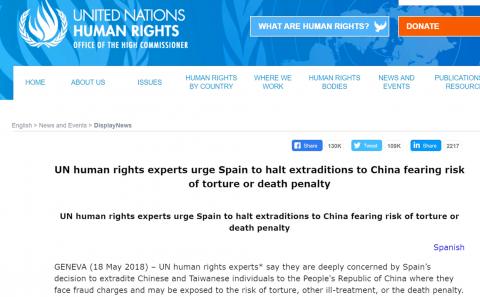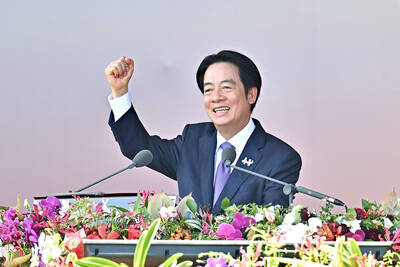Several UN human rights experts have expressed concern about Spain’s decision to deport Taiwanese fraud suspects to China, saying that they could face torture and other ill treatment there.
The Office of the UN High Commissioner for Human Rights on Friday published an article in which the experts urged Spain to halt deportations of fraud suspects to China after two Taiwanese were deported to China on Thursday.
The two were part of a group of 269 suspects, including 219 Taiwanese, who were arrested by Spanish authorities in December 2016 over their alleged involvement in telecom fraud.

Screen grab from the Office of the UN High Commissioner for Human Rights’ Web site
“We are dismayed by the decision by the Spanish courts to extradite these individuals. The ruling clearly contravenes Spain’s international commitment to refrain from expelling, returning or extraditing people to any state where there are well-founded reasons to believe that they might be in danger of being subjected to torture,” the experts said.
The suspects could face severe sanctions in China for the crimes they are accused of, including forced labor or even capital punishment, they said.
They also expressed concern over what they called Spain’s failure to adequately investigate allegations by some of the suspects that they were taken to Spain on the promise of working as tour guides, insinuating that they could have been victims of human trafficking.
“Any policy of deporting people without due process safeguards, case-by-case risk assessments and adequate protection measures violates international law and exposes them to the risk of further human rights violations, including arbitrary detention, ill-treatment and torture,” the experts said.
Echoing the UN experts, the Ministry of Foreign Affairs — which had protested Thursday’s deportations — yesterday renewed calls for the Spanish government to properly handle the case based on the principles of humanitarianism and human rights protection.
“Madrid is urged to adhere to the Charter of Fundamental Rights of the EU, as well as the universal values of rule of law, human rights and freedom, and join us in combating transnational crimes,” the ministry said in a statement.
Spain is not the first nation to deport Taiwanese facing fraud charges to China due to pressure from Beijing.
Since the first such incident occurred in April 2016, several nations have chosen to abide by Beijing’s “one China” principle and deport Taiwanese fraud suspects to China, including Kenya, Armenia, Malaysia, Indonesia, Cambodia and Vietnam.
The latest deportations by Spain raised the number of Taiwanese telecom fraud suspects who have been deported to China to more than 360.

The Ministry of the Interior (MOI) is to tighten rules for candidates running for public office, requiring them to declare that they do not hold a Chinese household registration or passport, and that they possess no other foreign citizenship. The requirement was set out in a draft amendment to the Enforcement Rules of the Public Officials Election and Recall Act (公職人員選舉罷免法 ) released by the ministry on Thursday. Under the proposal, candidates would need to make the declaration when submitting their registration forms, which would be published in the official election bulletin. The move follows the removal of several elected officials who were

FOUR DESIGNATED AREAS: Notices were issued for live-fire exercises in waters south and northwest of Penghu, northeast of Keelung and west of Kaohsiung, they said The military is planning three major annual exercises across the army, navy and air force this month, with the navy’s “Hai Chiang” (海強, “Sea Strong”) drills running from today through Thursday, the Ministry of National Defense said yesterday. The Hai Chiang exercise, which is to take place in waters surrounding Taiwan, would feature P-3C Orion maritime patrol aircraft and S-70C anti-submarine helicopters, the ministry said, adding that the drills aim to bolster the nation’s offshore defensive capabilities. China has intensified military and psychological pressure against Taiwan, repeatedly sending warplanes and vessels into areas near the nation’s air defense identification zone and across

SENATE RECOMMENDATION: The National Defense Authorization Act encourages the US secretary of defense to invite Taiwan’s navy to participate in the exercises in Hawaii The US Senate on Thursday last week passed the National Defense Authorization Act (NDAA) for Fiscal Year 2026, which strongly encourages the US secretary of defense to invite Taiwan’s naval forces to participate in the Rim of the Pacific (RIMPAC) exercise, as well as allocating military aid of US$1 billion for Taiwan. The bill, which authorizes appropriations for the military activities of the US Department of Defense, military construction and other purposes, passed with 77 votes in support and 20 against. While the NDAA authorizes about US$925 billion of defense spending, the Central News Agency yesterday reported that an aide of US

NATIONAL DAY: The ‘Taiwan Dome’ would form the centerpiece of new efforts to bolster air defense and be modeled after Israel’s ‘Iron Dome,’ sources said President William Lai (賴清德) yesterday pledged to strengthen the nation’s air defense capabilities and build a “T-Dome” system to create a safety net against growing military threats from China. “We will accelerate our building of the T-Dome, establish a rigorous air defense system in Taiwan with multi-layered defense, high-level detection and effective interception, and weave a safety net for Taiwan to protect the lives and property of citizens,” he said in his National Day address. In his keynote address marking the Republic of China’s (ROC) 114th anniversary, Lai said the lessons of World War II have taught nations worldwide “to ensure that